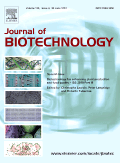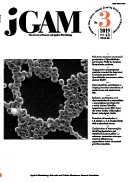
Synthetic and Systems Biotechnology
Scope & Guideline
Connecting Disciplines for Revolutionary Insights
Introduction
Aims and Scopes
- Metabolic Engineering:
Research aimed at modifying metabolic pathways in microorganisms to enhance the production of desired compounds, including biofuels, pharmaceuticals, and specialty chemicals. - Synthetic Biology:
Development and application of synthetic biological parts and systems for novel biotechnological applications, including the design of new genetic circuits and gene editing technologies. - Microbial Biotechnology:
Utilization of microorganisms for biotechnological applications, including the production of natural products, bioremediation, and the development of microbial cell factories. - Omics Technologies:
Use of genomics, proteomics, and metabolomics to understand biological systems and improve strain performance through data-driven approaches. - Bioprocess Development:
Focus on optimizing fermentation processes and bioprocesses for the industrial production of biomolecules, including the design of bioreactors and scaling-up processes. - Environmental Biotechnology:
Research on the application of biotechnological solutions to environmental issues, such as pollution remediation and sustainable waste management.
Trending and Emerging
- CRISPR and Genome Editing Technologies:
There is a marked increase in publications related to CRISPR and other genome editing technologies, showcasing their application for precise modifications in various organisms, particularly in metabolic engineering. - Artificial Intelligence and Machine Learning Applications:
Emerging interest in leveraging AI and machine learning to enhance biotechnological processes and predictive modeling, indicating a trend towards more data-driven approaches in biotechnology. - Sustainable Biomanufacturing:
A growing focus on sustainable practices in biomanufacturing, including the use of waste substrates and renewable resources, reflecting a broader societal push towards sustainability. - Synthetic Microbial Consortia:
Research on engineered microbial consortia for enhanced production of bioproducts is trending, indicating a shift towards utilizing community dynamics for improved biotechnological outcomes. - Biocatalysis and Enzyme Engineering:
Increased attention is being paid to the engineering of enzymes and biocatalysts for various industrial applications, highlighting the importance of tailored biocatalytic processes.
Declining or Waning
- Traditional Fermentation Processes:
There appears to be a declining emphasis on traditional fermentation methods in favor of more engineered and synthetic approaches that combine various biotechnological innovations. - Natural Product Discovery via Classical Methods:
Research focused on the classical methods of isolating and characterizing natural products is waning, as there is a shift towards synthetic biology approaches for the biosynthesis of complex compounds. - Exclusively Theoretical Studies:
There is a noticeable decrease in purely theoretical studies without experimental validation, as the journal increasingly prioritizes research that combines computational modeling with practical applications. - Single-Organism Studies:
Research focusing solely on single organisms is declining, as the field moves towards more integrative approaches that involve synthetic communities and multi-species interactions.
Similar Journals

ENGINEERING IN LIFE SCIENCES
Pioneering Research for a Sustainable Future in BioengineeringENGINEERING IN LIFE SCIENCES, published by Wiley, is a pivotal journal for professionals, researchers, and students dedicated to advancing the interdisciplinary fields of bioengineering, biotechnology, and environmental engineering. With an ISSN of 1618-0240 and an E-ISSN of 1618-2863, this journal has established itself as a reputable platform for disseminating innovative research findings and breakthroughs in engineering applications within the life sciences. Currently holding a prestigious Q2 ranking in multiple categories, including bioengineering and environmental engineering, it reflects a strong commitment to high-quality, impactful research (Scopus ranks: Environmental Science - Rank #61/197, Biochemistry, Genetics and Molecular Biology - Rank #112/311). The journal spans contributions from 2004 to 2024, ensuring a comprehensive archiving of evolving scientific discourse. Although it does not currently offer open access, its curated articles are accessible through institutional and single-article purchases, providing valuable insights and updates for the academic community. Join us in shaping the future of engineering within life sciences and stay informed on critical advancements that are driving innovation across multiple disciplines.

Biotechnology for Biofuels
Pioneering research for a greener biofuel future.Biotechnology for Biofuels, published by BMC in the United Kingdom, stands at the forefront of renewable energy research. As an open-access journal since 2008, it has become a critical platform for sharing innovative research and developments in the field of applied microbiology and biotechnology, particularly in the sustainable production of biofuels. With an impressive 2023 ranking of Q1 in multiple categories—including Applied Microbiology and Biotechnology, Biotechnology, and Management, Monitoring, Policy and Law—this journal offers unparalleled visibility and accessibility for your work. Its Scopus metrics underscore its influence, with rankings in the top 10% across several categories, emphasizing its integral role in advancing research on environmental sustainability and bioenergy solutions. Researchers, professionals, and students alike will find in this journal a rich resource for current studies, methodologies, and policies essential for navigating the complex landscape of biofuel technology.

CRITICAL REVIEWS IN BIOTECHNOLOGY
Transforming Research Through Critical AnalysisCRITICAL REVIEWS IN BIOTECHNOLOGY, published by Taylor & Francis Ltd, stands as a leading journal in the field of biotechnology, consistently recognized for its rigorous peer-reviewed articles that impact the disciplines of Applied Microbiology, Biotechnology, and Medicine. With an impressive Q1 ranking in these categories and a significant influence reflected in its Scopus rankings—placing it within the top 5% of Applied Microbiology and the top 4% of Biotechnology journals—the journal serves as an essential resource for researchers, professionals, and students alike. Launched in 1983 and extending its coverage to encompass groundbreaking findings through 2024, it provides a rich forum for insightful reviews and innovative research that propel the field forward. Though not an Open Access journal, CRITICAL REVIEWS IN BIOTECHNOLOGY remains a vital point of reference for ongoing developments, critical analyses, and emerging trends, making it indispensable for those seeking to stay at the forefront of biotechnological advancements.

BIOTECHNOLOGY AND BIOPROCESS ENGINEERING
Advancing the Frontiers of Biotechnology and BioengineeringBIOTECHNOLOGY AND BIOPROCESS ENGINEERING, published by the Korean Society for Biotechnology and Bioengineering, is a prominent journal in the fields of applied microbiology, biotechnology, bioengineering, and biomedical engineering. Since its inception in 1996, this journal has served as a vital platform for researchers and professionals, facilitating the dissemination of cutting-edge research and innovative applications related to bioprocesses and biotechnology systems. With an ISSN of 1226-8372, this journal is ranked within the Q3 quartile across several categories, demonstrating its relevance and impact in the academic community. Although it operates under traditional access modalities, the journal strives to provide quality and timely insights into the advancements in bioprocess technology and microbial applications, fostering a collaborative environment for knowledge exchange. Notably, it is indexed with a respectable presence on Scopus, making it a valuable resource for students and professionals seeking the latest developments in biotechnology. For more details, kindly refer to the Korean Science Technology Center, #704 Yeoksam-Dong, Gangnam-Ku, Seoul 135-703, South Korea.

JOURNAL OF BIOTECHNOLOGY
Championing innovative research in applied microbiology.JOURNAL OF BIOTECHNOLOGY, published by Elsevier, stands as a premier platform in the fields of Applied Microbiology, Biotechnology, Bioengineering, and Medicine. With an ISSN of 0168-1656 and an E-ISSN of 1873-4863, this journal has significantly contributed to the advancement of biotechnological research since its inception in 1984 and continues to be a vital resource until 2024. Notably ranked in the Q2 quartile across multiple categories, it excels with impressive Scopus rankings, placing within the top 20% in Applied Microbiology and Biotechnology. This underscores its impact on both the scientific community and the ongoing developments in biotechnological applications. The journal encourages submissions that promote innovative research and practical insights, fostering collaboration among researchers, professionals, and students alike. Although it does not currently offer Open Access options, the journal remains highly regarded for its rigorous peer-review process and commitment to excellence in biotechnological literature.

JOURNAL OF GENERAL AND APPLIED MICROBIOLOGY
Unveiling the microscopic world for practical solutions.JOURNAL OF GENERAL AND APPLIED MICROBIOLOGY, published by the MICROBIOL RES FOUNDATION, is a vital resource in the fields of applied microbiology and biotechnology, as well as in diverse medical applications, serving an academic community dedicated to advancing microbial science. Established in 1955, this journal has a rich history of disseminating innovative research and insights into the intricate world of microorganisms. With an ISSN of 0022-1260 and an E-ISSN of 1349-8037, the journal maintains high scholarly standards and robustness, reflected in its 2023 Scopus rankings placing it in the Q3 and Q4 quartiles within its categories. While primarily based in Japan, the journal engages a global audience, offering valuable contributions that inform both theoretical perspectives and practical applications in microbiology. Despite being a non-open-access publication, it provides pivotal research findings essential for academics, professionals, and students alike, fostering a deeper understanding of microbial impact on health and the environment.

Microbial Cell Factories
Fostering Global Collaboration in Microbial ResearchMicrobial Cell Factories is a premier peer-reviewed journal dedicated to the field of applied microbiology and biotechnology, published by BMC in the United Kingdom since 2002. With an impressive impact factor, this journal has consistently ranked within the Q1 category across multiple disciplines, including Applied Microbiology, Bioengineering, and Biotechnology, showcasing its significance in the scientific community. The journal’s commitment to open access ensures that innovative research is freely available to researchers, professionals, and students worldwide, fostering collaboration and knowledge dissemination. With a strong presence in Scopus rankings, Microbial Cell Factories is recognized for its contributions to advancing the understanding and application of microbial processes in production systems, making it an essential resource for those involved in the microbiological and biotechnological fields.

APPLIED MICROBIOLOGY AND BIOTECHNOLOGY
Empowering discoveries that shape our world.Applied Microbiology and Biotechnology, an esteemed journal published by Springer, serves as a vital resource in the domains of microbiology and biotechnology. With an impressive impact factor reflecting its quality, the journal holds Q1 rankings in various categories including Applied Microbiology and Biotechnology, Biotechnology, and Medicine (Miscellaneous) as of 2023. Spanning the years from 1984 to 2024, it underscores its commitment to disseminating groundbreaking research that addresses pressing challenges in health, agriculture, and environmental sustainability. The journal is rigorously indexed and holds respectable positions in Scopus rankings, notably within the top 15% of Applied Microbiology and Biotechnology and the top 15% in Biochemistry, Genetics, and Molecular Biology. Although it is not Open Access, its comprehensive articles, reviews, and short communications are indispensable for researchers, professionals, and students eager to advance their understanding and application of microbial processes and biotechnological innovations in real-world contexts.

APPLIED BIOCHEMISTRY AND BIOTECHNOLOGY
Connecting Science and Technology for a Better TomorrowApplied Biochemistry and Biotechnology is a leading journal published by Springer, dedicated to advancing research in the interdisciplinary fields of biochemistry, biotechnology, and applied microbiology. Established in 1981, this peer-reviewed journal covers a wide range of topics that encompass innovative techniques, methodologies, and applications of biochemistry and biotechnology in medicine, environmental engineering, and molecular biology. With a Q2 ranking in several categories and an increasing impact factor, the journal demonstrates significant influence and credibility within the scientific community. While traditionally subscription-based, the journal offers avenues for open access through selective agreements, making high-quality research accessible to a broader audience. Researchers, professionals, and students alike will find Applied Biochemistry and Biotechnology to be an invaluable resource for the latest developments and applications in biochemistry and its related fields, aiding in the quest for sustainable solutions and novel biotechnological advancements.

Research Journal of Biotechnology
Unlocking the potential of biotechnological innovations.Research Journal of Biotechnology is a premier publication dedicated to advancing the field of biotechnology through the dissemination of impactful research articles. Published by Research Journal Biotechnology in India, this journal operates under an Open Access model, facilitating unrestricted access to high-quality research for researchers, professionals, and students worldwide. With an ISSN of 2278-4535 and an E-ISSN of 2278-4535, the journal aims to serve as a comprehensive platform for innovative studies in Applied Microbiology and Biotechnology, Bioengineering, and Biotechnology. Despite its current Q4 quartile ranking in these categories, the journal aspires to extend its influence and visibility in the academic community, aiming for greater impact in the future. The journal features research articles that span a wide array of topics in biotechnology, fostering a collaborative and knowledge-rich environment for national and international scholars. We invite you to explore, contribute to, and engage with the expanding landscape of biotechnological research through the Research Journal of Biotechnology.